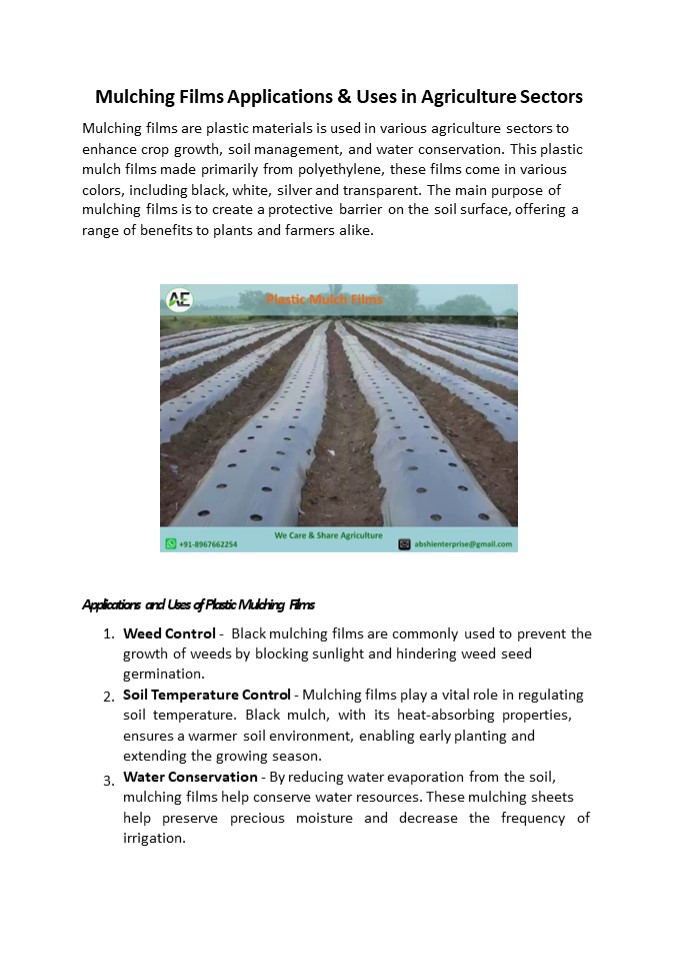Mulching Films Applications & Uses in Agriculture Sectors - PowerPoint PPT Presentation
Title:
Mulching Films Applications & Uses in Agriculture Sectors
Description:
Mulching films are plastic materials is used in various agriculture sectors to enhance crop growth, soil management, and water conservation. This plastic mulch films made primarily from polyethylene, these films come in various colors, including black, white, silver and transparent. The main purpose of mulching films is to create a protective barrier on the soil surface, offering a range of benefits to plants and farmers alike. – PowerPoint PPT presentation
Number of Views:1
Title: Mulching Films Applications & Uses in Agriculture Sectors
1
Mulching Films Applications Uses in Agriculture
Sectors Mulching films are plastic materials is
used in various agriculture sectors to enhance
crop growth, soil management, and water
conservation. This plastic mulch films made
primarily from polyethylene, these films come in
various colors, including black, white, silver
and transparent. The main purpose of mulching
films is to create a protective barrier on the
soil surface, offering a range of benefits to
plants and farmers alike.
Applications and Uses of Plastic Mulching Films
1.
Weed Control - Black mulching films are commonly
used to prevent the growth of weeds by blocking
sunlight and hindering weed seed
germination. Soil Temperature Control - Mulching
films play a vital role in regulating soil
temperature. Black mulch, with its
heat-absorbing properties, ensures a warmer
soil environment, enabling early planting and
extending the growing season. Water Conservation
- By reducing water evaporation from the soil,
mulching films help conserve water resources.
These mulching sheets help preserve precious
moisture and decrease the frequency
of irrigation.
2.
3.
2
4.
Erosion Control - Mulching films act as a
protective shield, shielding the soil from the
erosive effects of wind and water.
5.
Improved Soil Quality -
Mulching films contribute to improving soil
structure by preventing compaction and crusting.
These films facilitate better water and air
penetration, creating a favourable environment
for root development and nutrient
absorption. Disease and Pest Management - In
some cases, specific types of mulching films
can contribute to reducing certain diseases and
pests. Some mulching films, like silver or
aluminium-coated ones, act as deterrents to
certain pests like aphids, effectively reducing
the spread of plant diseases caused by
insects. Early Harvests - The microclimates
formed by mulching films enable farmers to start
planting earlier in the season and extend the
harvest period. Agriculture mulching films can
extend the growing season, allowing farmers to
plant crops earlier in the spring and harvest
them later in the fall.
6.
7.
8.
Enhanced Crop Yield and Quality -
The combined effects of weed
control, moisture retention, temperature
regulation, and better soil conditions,
mulching films contribute to higher crop yields
and enhanced produce quality. Sustainable
Agriculture - Mulching films promote sustainable
agriculture by reducing the need for chemical
herbicides, minimizing water usage, and
optimizing resource efficiency.
9.
Biodegradable and compostable mulching sheet
films are being developed to
address
these
environmental
concerns
and
provide
an
eco-friendlier
alternative. Now a days plastic mulching films
will likely remain an integral part of modern
farming practices. For more visit -
https//abshienterprise.wordpress.com/































